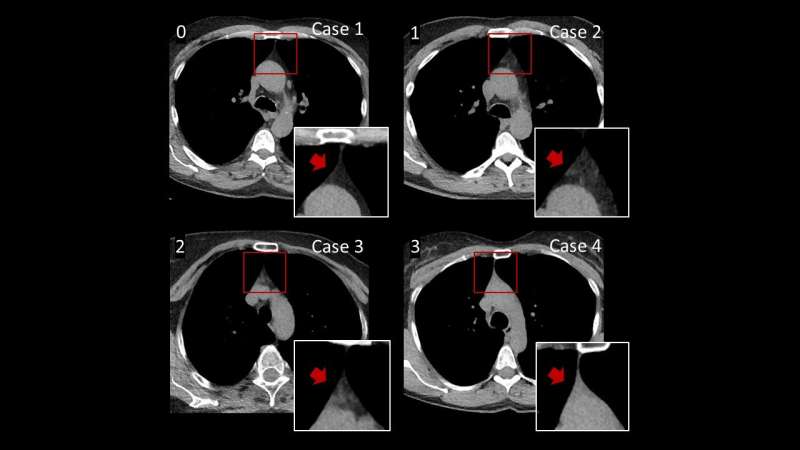This article has been reviewed according to Science X's editorial process and policies. Editors have highlighted the following attributes while ensuring the content's credibility:
fact-checked
trusted source
proofread
Immune system aging can be revealed by CT scan of thymus, research suggests

The thymus, a small and relatively unknown organ, may play a bigger role in the immune system of adults than was previously believed. With age, the glandular tissue in the thymus is replaced by fat, but, according to a new study from Linköping University, the rate at which this happens is linked to sex, age and lifestyle factors. These findings also indicate that the appearance of the thymus reflects the aging of the immune system.
"We doctors can assess the appearance of the thymus from largely all chest CT scans, but we tend to not see this as very important. But now it turns out that the appearance of the thymus can actually provide a lot of valuable information that we could benefit from and learn more about," says Mårten Sandstedt, MD, Ph.D., at the Department of Radiology in Linköping and Department of Health, Medicine and Caring Sciences, Faculty of Medicine and Health Sciences, Linköping University.
The thymus is a gland located in the upper part of the chest. It has been long known that this small organ is important for immune defense development in children. After puberty, the thymus decreases in size and is eventually replaced by fat, in a process known as fatty degeneration. This has been taken to mean that it loses its function, which is why the thymus has for a long time been considered as being not important in adult life.
This view has however been challenged in some minor research studies, mainly on animals, that indicate that having an active thymus as an adult may be an advantage and could provide increased resilience against infectious disease and cancer. Only very few studies so far have examined the thymus in adults.
In the present study, published in Immunity & Ageing, the researchers have examined thymus appearance in chest CT scans of more than 1,000 Swedish individuals aged 50 to 64, who participated in the large SCAPIS study (Swedish cardiopulmonary bioimage study). SCAPIS includes both extensive imaging and comprehensive health assessments including lifestyle factors, such as dietary habits and physical activity. In their sub-study of SCAPIS, the researchers also analyzed immune cells in the blood.
"We saw a huge variation in thymus appearance. Six out of ten participants had complete fatty degeneration of thymus, which was much more common in men than in women, and in people with abdominal obesity. Lifestyle also mattered. Low intake of fiber in particular was associated with fatty degeneration of thymus," says Mårten Sandstedt.
The Linköping researchers study provides new knowledge by associating thymus appearance with lifestyle and health factors, and the immune system. In the development of the immune system, the thymus acts like a school for a type of immune cells known as T-cells (where the T stands for "thymus"). This is where the T-cells learn to recognize bacteria, viruses and other things that are alien to the body. They also learn to be tolerant and not attack anything that is part of the person's own body, which could otherwise lead to various autoimmune diseases.
In their study, the LiU researchers saw that individuals with fatty degeneration of the thymus showed lower T-cell regeneration.
"This association with T-cell regeneration is interesting. It indicates that what we see in CT scans is not only an image, it actually also reflects the functionality of the thymus. You can't do anything about your age and your sex, but lifestyle-related factors can be influenced. It might be possible to influence immune system aging," says Lena Jonasson, professor at the Department of Cardiology in Linköping and Department of Health, Medicine and Caring Sciences, Faculty of Medicine and Health Sciences, Linköping University.
But more research is needed before it will be possible to know whether thymus appearance, and thereby immune defense aging, will have any implications for our health. The researchers are now moving on to follow-up studies of the thymus of all 5,000 participants in SCAPIS Linköping to see whether CT scan thymus images can provide information on future risk of disease.
More information: Mårten Sandstedt et al, Complete fatty degeneration of thymus associates with male sex, obesity and loss of circulating naïve CD8+ T cells in a Swedish middle-aged population, Immunity & Ageing (2023). DOI: 10.1186/s12979-023-00371-7



















